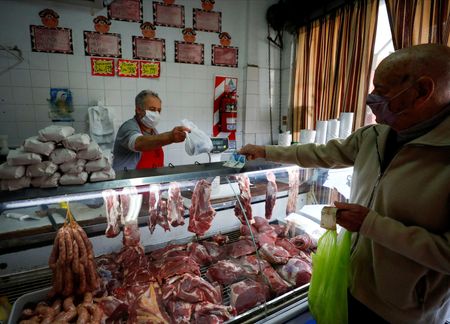
By Miguel Lo Bianco and Horacio Soria
BUENOS AIRES (Reuters) – Argentines are increasingly feeling the impact of one of the world’s highest inflation rates, with annual price rises nearing 100%, straining people’s budgets as the cost of food, gas and services far outstrips salaries.
The South American country, which has grappled with high inflation for years, is set to announce January data on Tuesday, with monthly inflation expected to accelerate to around 6% and the 12-month figure nearing three digits.
“The truth is that I live day to day, I look for low prices, I go to markets. We look for where the meat is cheaper, the vegetables are cheaper, and hunt for online promotions to get by,” said Gisella Saluzzo, 30, a doctor in Buenos Aires.
Rampant inflation has weighed heavily upon the economy, forcing the central bank to hike interest rates to an eye-wateringly high 75%, and has hurt the popularity of the center-left Peronist government of President Alberto Fernandez.
That could be key ahead of general elections in October, with the conservative opposition ahead in the polls. Argentines are fed up with inflation and many blame poor economic management and money printing by the government.
Brian Muliane, a 33-year-old chiropractor, said that between inflation and taxes his business struggled to survive.
“In our work, between paying for one thing and another, along with taxes, they’re drowning us,” he said. “There are many who can’t even work.”
The inflation, which ended 2022 at 95% and could even accelerate this year despite government measures to limit price rises, has forced many to change their shopping habits and cut back on luxuries.
“There are things that I’ve stopped buying because I say no, it is just impossible for it to increase like this,” said 50-year-old teacher Andrea Mendoza as she was out shopping. “So I don’t buy some things, I change habits or buy offers.”
(Reporting by Miguel Lo Bianco and Horacio Soria; Editing by Adam Jourdan and Tomasz Janowski)

